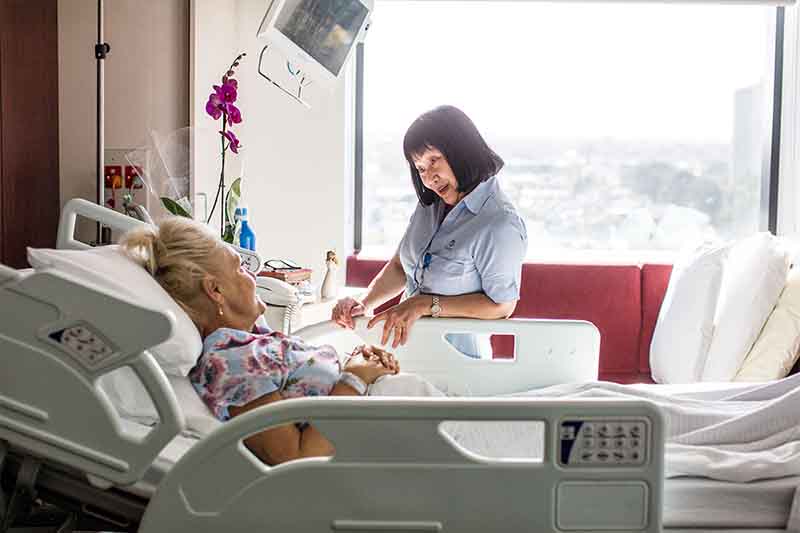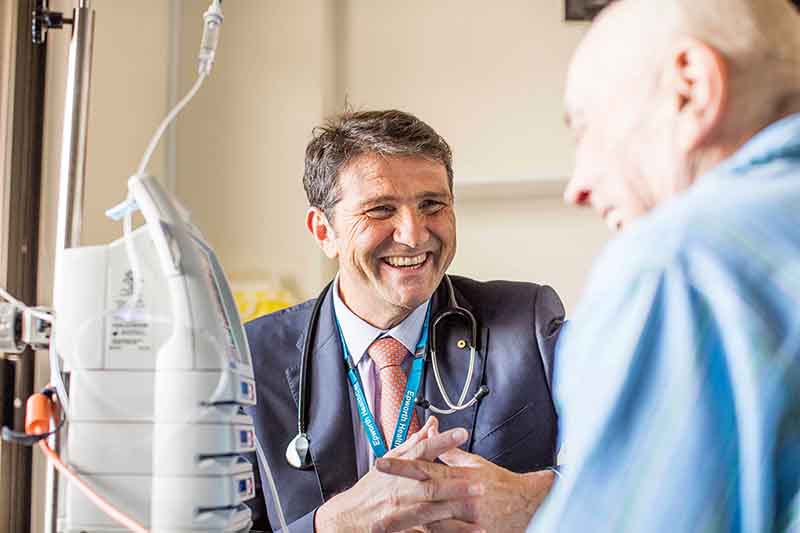Overview
Learning that you or someone you care for has stomach cancer can be an overwhelming and frightening experience. From initial diagnosis through to cure or relapse, our Epworth cancer care team are here to support you at every step of your cancer care journey.
Each person living with stomach cancer has individual needs depending on symptoms, health history and the stage of their cancer. Our team will proactively adjust the level of emotional and physical care provided to best suit your changing care needs, providing further options of support such as physiotherapy, dietitians and psychologists, as required.
Epworth fact sheet | What is stomach cancer?
-
What is stomach cancer?In Australia, stomach cancer is relatively common and occurs when cancerous cells (such as tumours) begin to grow in any part of the stomach.
-
What are the types of stomach cancer?
The main type of stomach cancer is:
- Gastric adenocarcinoma
Gastric adenocarcinoma is the most common type of stomach cancer and develops when tumours grow in the tissue lining the stomach.
Other less common types are:
- Small cell carcinomas, lymphomas, neuroendocrine tumours, and gastrointestinal stromal tumours (GIST).
Your Epworth care team will run diagnostic tests to assess whether your tumours are cancerous or not.
To learn more about rare types of stomach cancer, please visit Pancare Foundation Australia.
- Gastric adenocarcinoma
-
What are the risk factors for stomach cancer?
Factors that may put you at higher risk of developing stomach cancer include:
- Age (those aged over 60)
- Smoking tobacco
- A family history of stomach cancer
- Excessive drinking
- Men are more likely than women to develop stomach cancer
- Being overweight
- Infection with the bacteria Helicobacter Pylori
- Low red blood cells (Pernicious anaemia)
- Chronic Gastritis (inflammation of the stomach)
Signs and symptoms of stomach cancer
It's natural and common for changes to occur to your body as you age or go through stressful life events. However, we encourage you to consult your GP if your health concerns persist.
Signs and symptoms of stomach cancer can include but are not limited to:
- Unexplained fatigue
- Unexplained weight loss
- Lower abdominal pain or burning sensation
- Black-coloured faeces
- Nausea or vomiting (blood may be present in the vomit)
- Swelling of the abdomen
Stomach cancer diagnosis
Screening for stomach cancer
A screening test allows a doctor to routinely check for types of cancer such as breast cancer, however there is currently no screening test for stomach cancer.
How is stomach cancer diagnosed?
Epworth provides patients with access to several thorough diagnostic tests to further investigate signs and symptoms of stomach cancer, to rule out or diagnose conditions.
To investigate your health concerns, your Gastroenterologist or GP may schedule one or several of the following tests:Blood tests
Though blood tests are not a diagnostic tool for stomach cancer, tests may be scheduled by your doctor during your first consultation, to check your overall blood and liver health.
Stool tests
Your doctor may request a stool sample to determine whether there are small traces of blood in your stool.
Endoscopy
An endoscopy is a common diagnostic test for stomach cancer. A thin tube with a camera at the end, known as an endoscope, will enter through your mouth and be used to look at your stomach for signs of cancer. At Epworth, an endoscopy is generally performed as a day procedure.
Biopsy
During an endoscopy, a biopsy may be performed. A biopsy is the removal of a small piece of tissue that will be examined under a microscope.
Staging - investigating the extent of the cancer
Your Epworth specialist may recommend further tests, such as CT scans, to understand whether cancer has spread. These tests will enable your care team to establish your cancer as stage 1 to 4. Staging helps your care team and specialists create a unique treatment plan.
What does my cancer stage mean?
Stage 1
The cancerous tumour is relatively small and the cancer has not yet spread to other tissue.
Stage 2
Cancerous tumour remains relatively localised but has spread to nearby tissue beyond its origin.
Stage 3
Cancer has spread regionally and affected surrounding tissue and may have grown.
Stage 4
Sometimes called advanced cancer, stage 4 means cancer has spread to other tissue or organs beyond the region where it originated.
Find your Epworth stomach cancer specialist
Gastroenterologists | Upper GI surgeons | Medical oncologists | Radiation oncology service
Treatment for stomach cancer
We understand that treatment options can be overwhelming. Epworth oncologists and specialists are here to guide and support you to make the best choice for your health.
Stomach cancer treatment with Epworth
Following a diagnosis of stomach cancer, your oncologist and cancer care team will create a treatment plan tailored to the specific stage and type of stomach cancer. Your Epworth specialist will discuss the treatment options with you and consider your circumstances and preferences
Below is an overview of common stomach cancer treatments:
Surgery
Surgery is the most common treatment for stomach cancer. Depending on the stage of your stomach cancer and where the tumours are, your care team may recommend one of two forms of surgery:
- Partial gastrectomy: during partial gastrectomy surgery, a section of the stomach is removed.
- Total gastrectomy: depending on your age, circumstances and stage of stomach cancer, your doctor may recommend the entire stomach is removed.
Chemotherapy
Chemotherapy is a common form of treatment that involves the use of anti-cancer drugs to attack cancer cells. Chemotherapy is often used in conjunction with stomach cancer surgery.
Why choose Epworth for cancer care?
Epworth HealthCare is Victoria's largest not-for-profit private hospital group, renowned for excellence in diagnosis, treatment, care and rehabilitation. Epworth is an innovator in Australia’s health system, embracing the latest in evidence-based medicine to pioneer treatments and services for our patients.
Supported by excellent facilities, we integrate clinical practice with education and research to deliver outstanding patient care, each and every day.
Epworth cancer care locations
Stomach cancer locations:
Stomach cancer rehabilitation
Rehabilitation doesn't start after your treatment has ended. You may benefit from our holistic rehabilitation programs at any time throughout your cancer journey. Our programs can support you to physically and emotionally prepare for treatment and restore your strength and wellbeing.
What does the cancer rehabilitation program involve?
Before you start
You will meet a rehabilitation doctor and allied health team for a medical, psychosocial, and physical assessment.
Everyone's cancer care journey is different. The assessments will help the team understand your specific needs to develop the right program for you. You will work with the team to develop goals to work towards throughout the program.
During the program
Depending on your assessment and individual needs, you may complete your program:
- as part of a group, with other people, who have been diagnosed with varying cancers
- on your own
Most people will attend as an outpatient, coming to hospital for a few hours once or twice a week, over several weeks. Some people may need to stay overnight in hospital and complete a program over several consecutive days.
Either way, you will receive the same support from our team to address your physical, functional and emotional needs.
Your program may include:
- A physical exercise component to help restore movement, strength and fitness
- An educational component where you will learn about different areas associated with your cancer diagnosis and treatment and how to manage them, including:
- fatigue
- pain
- emotional wellbeing
- body image and self-esteem
- work or family challenges
- relationships
- late-onset of side effects.
At the end of your program
Our rehabilitation team will keep in touch with your referring doctor and/or treating team throughout the program and our team will keep them informed about your progress.
They will also connect you to local services and support networks so you can leave our program with the strength and confidence to live life to your fullest potential.
Who will support me during the rehabilitation program?
Depending on your needs, you may see some or all of our multidisciplinary team which includes:
- Rehabilitation specialist doctor
- Cancer nurse
- Exercise physiologist
- Physiotherapist
- Psychologist
- Social worker
- Occupational therapist
- Dietitian.
How can I access a rehabilitation program?
Referrals
A referral from your specialist or GP is required to participate.
Ask your doctor to complete the referral form at www.epworth.org.au/rehab and return it to us via fax: 03 9982 6696 or email: [email protected]
Locations
Group programs are located at Epworth Camberwell and Epworth Hawthorn.
Individual programs can be accessed at Epworth Brighton, Epworth Camberwell, Epworth Geelong, Epworth Hawthorn or Epworth Richmond Rehabilitation.
Contact us
If you have any questions about our cancer rehabilitation programs, call us on: 1300 345 600.
Life after stomach cancer treatment
Life after stomach cancer treatment can pose its own challenges but our Epworth specialists are here to support you.
Remember
- You may still feel fatigued for a while after finishing treatment.
- If required, make an advanced care plan.
- Ask for help. If your body has changed due to treatment, remember help is available to support you to feel your best and regain your sense of identity and self-esteem. Speak with your care team about options to support your general wellbeing after treatment.
Follow-up appointments
Epworth patients, in remission for stomach cancer, will likely need follow-up appointments to ensure abnormal cells have not returned and to check on your overall wellbeing.
Managing your ongoing health and wellbeing
Knowing how to best manage your ongoing wellbeing is an essential step toward recovery. We encourage people who have been living with stomach cancer to eat a well balanced diet and seeing a dietician can be very helpful. If you are a smoker, quit as soon as you can and ensure regular follow up appointments to ensure any issues are dealt with swiftly.
Palliative care
In some cases, palliative care may be discussed with you and your family. Epworth palliative care aims to relieve you of symptoms and manage pain.
Find your Epworth stomach cancer specialist
Gastroenterologists | Upper GI surgeons | Medical oncologists | Radiation oncology service


